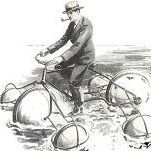-
Posts
7,060 -
Joined
-
Last visited
-
Days Won
20
Gibbo last won the day on December 18 2012
Gibbo had the most liked content!
About Gibbo
- Birthday 31/10/1963
Contact Methods
-
Website URL
http://www.smartgauge.co.uk
Profile Information
-
Gender
Male
-
Location
Middlewich
-
Interests
Guitar, irish folk music, most other music actually, hurdy gurdies, beer, electronics, boats.
-
Occupation
Electronic Design Engineer
-
Boat Name
Lionheart No 2
-
Boat Location
Nantwich
Recent Profile Visitors
13,397 profile views
Gibbo's Achievements
Veteran II (12/12)
344
Reputation
-
Gibbo started following The Peukert myth exposed and Lithium Batteries installation
-
Quantum mechanics now? I'm not getting involved. It's utter nonsense.
-
Long story but I got dragged back in by a private message. So... two points to make. 65watt hours gone. 65 watthours gone. I know they're the same, but someone here seems to have no problem counting things twice. And I'm gone again. Nick, you are wrong. Tara.
-
You don't know Nick very well if you think he can't argue about that
-
Basically, yes. Well, very close. Remove "amp-hour" and it's probably the most concise summary so far. LOL No such luck I'm afraid. My central heating broke. Not the best time of year for it. I had to deal with that. I think the Peukert argument has been done to death now, so... You meantioned 3D printers. I actually got one last year. Printed a Benchy, then a bigger one. I've not used it since. Most useless device I've had for a long time. Care to argue about that?
-
Nick, you are wrong. 65 watt hours. Not in heat.
-
Yet more irrelevant waffling. 65 missing watt hours. Not heat. Converted into lead suphate. Takes energy.
-
You're waffling again. I am in no way arguing against conservation of energy. But a battery cannot be thought of as an energy store in the way a capacitor can. Google Nernst. I think you're in for a surprise. I have never scoffed at degrees. Though clearly they don't always benefit their owners with wisdom. I have shown quite clearly that higher discharge rates result in a permanent loss of battery capacity, which you clearly stated was a temporary illusion of some sort, and that the apparently lost energy would become available again given a suitable rest period. That is clearly wrong as this thread has shown.
-
No. They absolutely have not. They were simply never created in the first place. Due to... Peukert's effect. i.e. slow ion migration resulting in less ions available at the plate/electrolyte interface. The Nernst equation defines the voltage generated in a cell and it is proportional to the log of the quantity of ions at the cell interface. Note "log". Hence why Peukert's equation is exponential. They are intimately connected. It has absolutely nothing (well, close to nothing. Close enough that it can be ignored for these purposes) to do with wasting energy into heat.
-
Throughout the two discharges battery A will have spent it at an average terminal voltage of 12.4 volts. Battery B will have been at an average of 11.1 volts. The load on the battery A will have benefitted from (converted, consumed, dissipated, call it whatever you want, it makes no difference). 12.1V x 5A x 10 hours = 620 watt hours of energy. The load on the battery B will have "benefitted" from 11.1V x 50A x 1 hour = 550 watt hours. Both batteries started at 100% SoC. You agree that they both ended the discharge in the same SoC. Where are the missing 65 watt hours? Your schoolboy error appears to be you believing an amp hour to be a unit of energy. It is not. This thought experiment proves beyond any doubt that higher discharge currents result in less available energy from the battery. The effect is permanent and cannot be "got around" by waiting a bit.
-
So Nick... I have stated all along that as the discharge current is increased, one gets less total energy from the battery. You maintain that is incorrect. Yes? You maintain that battery A and battery B are in exactly (or at least extremely close) the same SoC. Yes?
-
And you are absolutely certain of this? Or are you going to start backpedalling later? That's to Nick.
-
Not refuting anything. You, however, appear rather confused. Take two identical batteries. Battery A and battery B. Identical batteries. Same make, model, condition, batch etc. 100Ahr. Peukert's exponent of 1.2 Both batteries fully charged. Discharge battery A at 5 amps for ten hours. Discharge battery B at 50 amps for one hour. Now wait a few hours for things to settle. This removes your internal confusion regarding resting time and recovery etc. Wait however long you wish/desire. Are battery A and battery B now in the same SoC or different? It is a straight forward question. A simple question. It deserves a simple answer.
-
That doesn't quantify anything. Nick Stop all the waffling and A4 pages of irrelevant words. If a LA battery is discharged at a higher rate (current) you will get less total energy from it. This is the crux of the matter. To disagree with it points to some sort of fundamental schoolboy error.
-
Ah right, slow down there, energy is energy, whether you consider it useful or not. So pin it down properly. I have maintained from day one, that if you discharge a lead acid battery at a high discharge current, you will get less total energy from that battery. You either agree with that or you don't. Oh, you've gone quiet. Have you suddenly realised the bloke who had spent 35 years designing battery monitors is correct, and the bloke who meddled with them here and there and just come to the realisation that he's horribly wrong but is now struggling to accept that reality? Oh I hope you don't feel too embarrassed. Oh, you've gone quiet. Have you suddenly realised the bloke who had spent 35 years designing battery monitors is correct, and the bloke who meddled with them here and there and just come to the realisation that he's horribly wrong but is now struggling to accept that reality? Oh I hope you don't feel too embarrassed. Waiting... This is why I stayed away for ten years. Totally pointless arguments with armchair experts who have absolutely no idea what they are talking about, no track record of design products and whose only evidence is youtube videos. It's the flat earth argument all over again. Pointless. Tara. x
-
Wonderful. Clearly described, sciencifically detailed. So, lets try to pin it down to the shortest possible description we can get away with. One simple sentence/paragragh each. Is that fair? I maintain, if you discharge a lead acid battery at a high discharge rate, you will get less total energy from the battery than if you had dischared at a lower rate. But you didagree with that. Am I understanding you correctly?
















